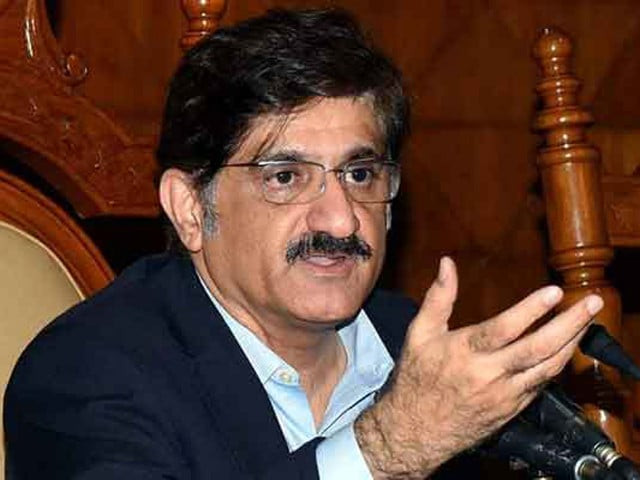Murad’s election shows continuation of policies
Shah is the first lawmaker to be elected as the chief minister three times in a row

Syed Murad Ali Shah made history in Sindh when he became the chief minister for the third consecutive term on Monday, an indication that the ruling Pakistan Peoples Party (PPP) would continue the same governance policy that had been pursued for the past 15 years.
Shah is the first lawmaker to be elected as the chief minister three times in a row. Previously, Syed Qaim Ali Shah had also served as the provincial chief minister three times, but for two consecutive terms.
Syed Murad Ali Shah is the son of former chief minister Syed Abdullah Shah, the first father-son duo in Sindh. The other similar examples were set by the Jam family of the Lasbela district of Balochistan and later by the Sharif family—Hamza and Shehbaz Sharif, and now Maryam and Nawaz Sharif.
Syed Murad Ali Shah started his political career in 2002, when he became a member of the provincial assembly (MPA) of Sindh from his home constituency in Sehwan. It was the same constituency that was represented by his late father, Abdullah Shah, from 1970 to 1993.
He played a pivotal role while sitting on the opposition benches during the Gen Musharraf tenure. He won the provincial assembly seat again in the 2008 and 2013 elections, becoming a minister in Syed Qaim Ali Shah’s cabinet. In 2016, he replaced Syed Qaim Ali Shah as the chief minister.
After the general elections in 2018, the PPP did not opt to shake up its Sindh set-up and continued with Shah in the top post in the province, which he held till the end of the government tenure in August 2023.
Born in Karachi in 1962, Shah received early education from St Patrick’s High School, Karachi, then went to the prestigious DJ Science College, Karachi, in 1979. He completed his bachelor's degree in Civil Engineeringg from the NED University, Karachi, in 1985.
Later, he did a Masters in Civil-Structural Engineering from Stanford University in California in 1987 and Engineering Economic Systems in 1993. Before joining politics, he worked both in the public and private sectors in Pakistan, the United Kingdom, Kuwait, and the United States from 1986 to 2002.
In Pakistan, he worked as an engineer for the Hyderabad Development Authority, the Water and Power Development Authority, the Port Qasim Authority, and the Karachi Fish Harbour Authority. Later, he changed his career and started working as an investment banker, first at Citibank Karachi, then at Citibank London, Gulf Investment Corporation Kuwait, and Bizpivot USA.
Why a third time?
For many in the PPP and outside, Shah is considered a heavyweight politician, currently holding the position of vice president in the party as well as taking a seat in its Central Executive Committee (CEC). Besides, he is also seen as a close confidant of the PPP’s top leadership.
Several party leaders, when approached by The Express Tribune, gave credit to Shah for the overwhelming performance of the PPP in the February 8 general elections. In the last assembly, PPP had 91 seats in the 168-strong house. Now, it has a resounding majority of 112 seats in the house.
“For the first time in the history of the PPP, we have won the post of mayor of Karachi, along with the PPP’s victories on many provincial and national assembly seats. So Murad Ali Shah deserves credit for the PPP government’s performance,” PPP Sindh President Nisar Khuhro told The Express Tribune.
“Murad Ali Shah always took up Sindh’s case diligently with the federal government when it came to the distribution of financial and water resources. So, there was a party consensus on his name for the slot of chief minister,” he added.
In fact, a few names did make the rounds on social media for the post of chief minister, such as Syed Nasir Hussain Shah, Sharjeel Inam Memon, and Faryal Talpur. However, the PPP leadership stayed firm behind Shah and got him elected for a record third term.
Shah’s critics attribute his phenomenal rise in politics to his ‘utmost obedience’ to the party leadership. “No doubt Murad Ali Shah is competent, but I think he is more obedient to leadership than others,” opined analyst and writer Prof Nawaz Khoso.
He does disagree [on certain matters] but blindly follows whatever orders are issued by the party leadership. The example of the Sindh government’s land being sold out to builders at throwaway prices and appointments of blue-eyed boys in the civil and police bureaucracy to appease party leaders can be quoted here,” Khoso added, while talking about his election.
“During the PPP term, Sindh witnessed massive bungling in government departments. Bad governance, poor infrastructure, ghost schools, a lack of medicines at government hospitals, as well as a deteriorating law and order situation, point to a bad performance. I don’t know why people laud his performance.”
It is also an interesting fact that since the PPP’s return to power in Sindh in 1988, seven of its total of eight chief ministers belonged to the ‘Syed’ families: three times Syed Qaim Ali Shah, one time Syed Abdullah Shah, and three times Murad Ali Shah.
The only exception is Aftab Shaban Mirani, who replaced Syed Qaim Ali Shah months before the sacking of then prime minister Benazir Bhutto’s first government in 1990. Syed Abdullah Shah was provincial chief executive from 1993 to 1996.
After a gap of 11 years, when the PPP came to power in 2008, it again nominated Syed Qaim Ali Shah for this coveted slot, who retained his position in 2013. He was relieved of the position in 2016. Since then, the position has been held by Murad Ali Shah.





1724319076-0/Untitled-design-(5)1724319076-0-208x130.webp)













COMMENTS
Comments are moderated and generally will be posted if they are on-topic and not abusive.
For more information, please see our Comments FAQ